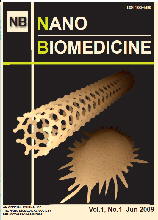
Nano Biomedicine
ORIGINAL ARTICLE
Improvement of the Bone Formation Ability of Stem Cells by Systemic Administration of Mizoribine
- Mizoribine for Bone Formation by Stem Cells -
Masataka YOSHIKAWA1, Ayano MIYAMOTO2,
Sadaomi SUGIMOTO1, and Hiroshi MAEDA1
1 Department of Endodontics, School of Dentistry, Osaka Dental University, Osaka, Japan
2 Dental health division, Health policy bureau, Ministry of Health, Labour and Welfare, Tokyo, Japan
Nano Biomed 2021; 13(2):49-58, (Dec 30, Nano Biomedicine)
Synopsis
The purpose of this study was to find novel factors that promote bone formation by the stem cells in vitro. The systemic administration of an immunosuppressive agent is expected to promote bone formation by stem cells. It was hypothesized that mizoribine (MZR) can increase mesenchymal stem cells for bone formation. Rat bone marrow cells (rBMCs) from the femur were used in this study. To obtain MZR-affected rBMCs (MZR-rBMCs), rats were injected with the agent subcuta-neously. Dexamethasone (Dex), β-glycerophosphate (β-GP), ascorbic acid (Vc) and different amounts of MZR were added in culture medium for the subculture of MZR-rBMCs and normal rBMCs. The effects of MZR were evaluated by comparing the Ca2+ quantity from calcified nodules formed in the subculture. Dex, β-GP and Vc in culture medium were essential for calcified nodule formation by rBMCs. MZR had no direct effects on rBMCs. MZR-rBMCs may promote calcified nodule formation.
Key words: immunosuppressant, stem cells, calcified nodule, dexamethasone, in vitro
All documents in this paper (Free)
J-Stage https://www.jstage.jst.go.jp/article/nano/13/2/13_13_49/_article
DOI https://doi.org/10.11344/nano.13.49
The purpose of this study was to find novel factors that promote bone formation by the stem cells in vitro. The systemic administration of an immunosuppressive agent is expected to promote bone formation by stem cells. It was hypothesized that mizoribine (MZR) can increase mesenchymal stem cells for bone formation. Rat bone marrow cells (rBMCs) from the femur were used in this study. To obtain MZR-affected rBMCs (MZR-rBMCs), rats were injected with the agent subcuta-neously. Dexamethasone (Dex), β-glycerophosphate (β-GP), ascorbic acid (Vc) and different amounts of MZR were added in culture medium for the subculture of MZR-rBMCs and normal rBMCs. The effects of MZR were evaluated by comparing the Ca2+ quantity from calcified nodules formed in the subculture. Dex, β-GP and Vc in culture medium were essential for calcified nodule formation by rBMCs. MZR had no direct effects on rBMCs. MZR-rBMCs may promote calcified nodule formation.
Key words: immunosuppressant, stem cells, calcified nodule, dexamethasone, in vitro
All documents in this paper (Free)
J-Stage https://www.jstage.jst.go.jp/article/nano/13/2/13_13_49/_article
DOI https://doi.org/10.11344/nano.13.49